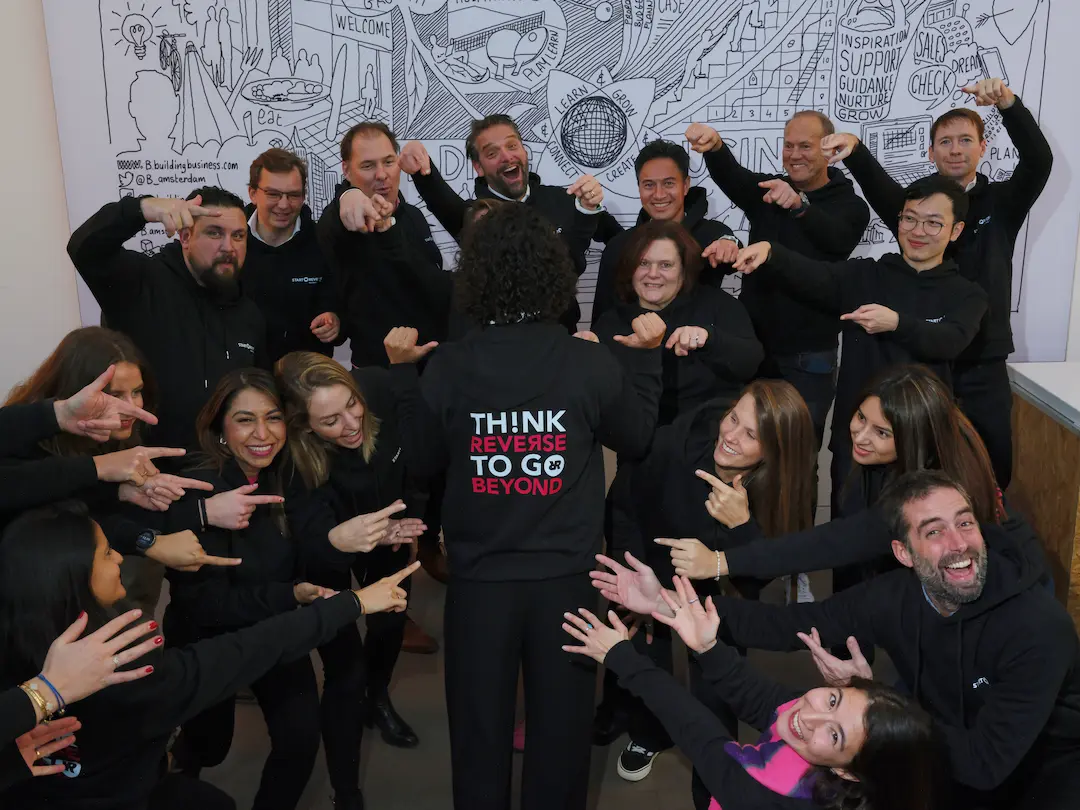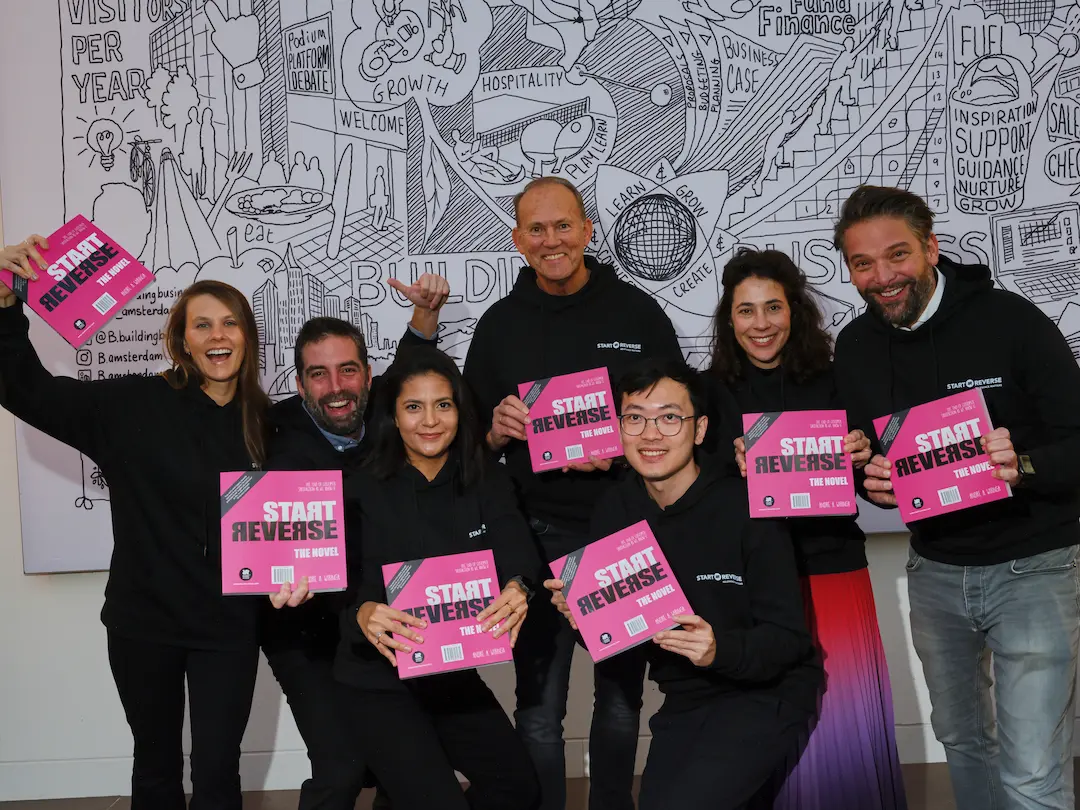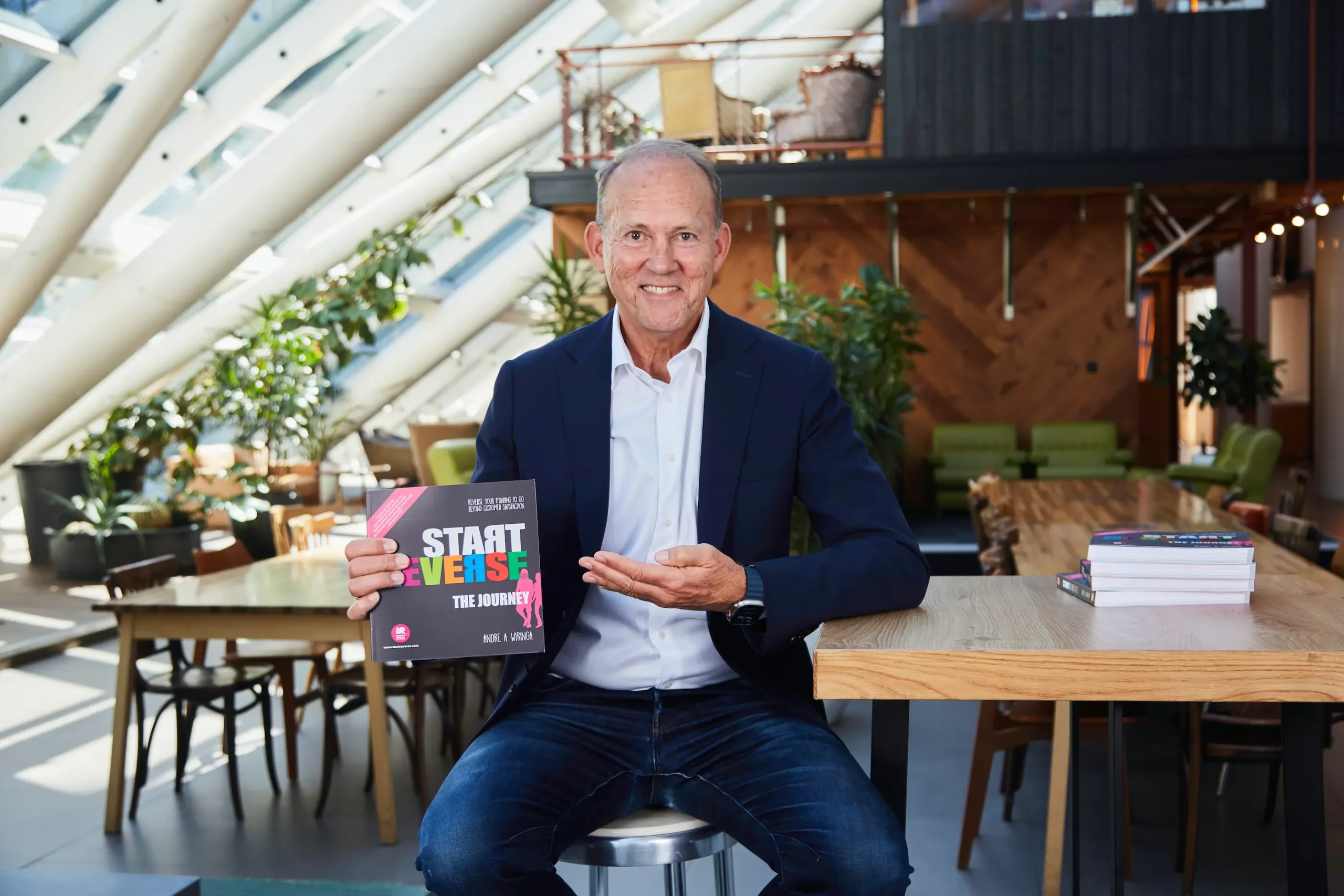In today’s edition, we sit down with Andre Wiringa, author of the book Start Reverse The Journey & The Novel and founder of Start Reverse, a boutique experience consultancy based in the Netherlands. With over 30 years of experience, Andre has helped companies across USA, Europe and the Middle East transform culture, leadership, and team engagement starting not with strategy, but with people.
Start Reverse was born from a simple but powerful observation: most people are not engaged at work, and it’s costing organizations far more than they realize. With only 23% of employees globally feeling truly engaged (Gallup, 2024), businesses face mounting losses, from the financial impact of disengagement to the unseen cost of missed potential, low retention, and underwhelming experiences. As of 2024, the global cost of employee disengagement is estimated at $8.9 trillion annually, which represents approximately 9% of global GDP. The impact goes beyond numbers. 73% percent of employees would leave their job today if a better place called, and 75% don’t leave companies, they leave their managers. Only 29% are satisfied with their development, despite data showing that high-performing cultures deliver up to four times more revenue growth.
For Start Reverse, these are not just stats. They are signals. Signals that the world of work is ready for reinvention. With their proprietary Blueprint model and human-first leadership approach, they are helping brands like Red Sea Global, Emaar Hospitality, and Rove Hotels turn disengagement into pride and transactions into meaningful moments. They begin with one essential question: how do we create environments where people don’t just show up, but come alive?
Their solution is rooted in co-creation. Start Reverse works hand-in-hand with leadership teams to design tailored Experience Blueprints that define how a brand should truly be felt by both employees and customers. These blueprints are then brought to life through immersive programs, leadership development, and cultural activation journeys that ensure values are not just stated but lived. The goal is always clear: to build workplaces where people thrive, grow, and become ambassadors of the brand. In a world flooded with automation and metrics, Start Reverse is proving that relevance, purpose, and connection remain the most powerful drivers of transformation.
In this artcile and interview, Andre shares his insights on what it means to lead with purpose, build relevance, and create experiences that truly stick.
People Make Places is more than a phrase. It is a timely call to action. In an age where artificial intelligence, automation, and data dominate boardroom discussions, we must not forget the irreplaceable role of human connection. Culture, not technology, is what ultimately determines whether transformation efforts succeed or fail.
Having spent over two decades collaborating with leaders and organizations across the Middle East and Europe, I have seen this truth play out countless times. Peter Drucker once said, “Culture eats strategy for breakfast.” And I have yet to see a better summary of why so many initiatives struggle to take root. You can write the most sophisticated roadmap. But if your people are not engaged, inspired, or aligned, the results will fall short.
Today, we find ourselves facing an even deeper shift. Millennials and Gen Z now make up the majority of the global workforce. Their expectations are reshaping what leadership and culture must look like. They want to work in organizations that reflect their values, give them a voice, and recognize their humanity. According to Gallup, only 23 percent of employees globally feel actively engaged at work. That number is even more concerning when you consider that engaged employees deliver 21 percent higher profitability and 17 percent greater productivity. The gap is real, and closing it should be a strategic priority.
One of the most powerful levers to bridge this gap is relevance. Relevance is not a marketing concept. It is a cultural one. It asks if we are meaningful to the people we serve and the people who work for us. In my experience, relevance is built through emotional connection, shared purpose, and consistency between what you say and what you do. As Maya Angelou once said, “People will forget what you said, people will forget what you did, but people will never forget how you made them feel.” That quote captures the essence of cultural relevance in a single line. The most effective leaders I have worked with understand that leadership is not about control. It is about connection.
This is especially true in the Middle East, a region undergoing unprecedented transformation. Vision 2030 in Saudi Arabia and innovation driven agendas across the UAE are reshaping economies and expectations. With that change comes an opportunity to redefine leadership, to invest in human potential, and to embed culture as a core business driver. Organizations like Red Sea Global are showing us what this looks like in practice. They are creating value beyond investing in local talent, championing environmental and cultural sustainability, and aligning every touchpoint with a clear purpose.
We believe in a simple but transformative truth: purpose drives engagement, engagement fuels performance, performance shapes experience, and experience builds brand value.
This chain of impact isn’t just a philosophy; it’s backed by compelling global data. Studies show that when people feel their work matters, their mindset shifts. According to McKinsey, employees who feel their work has purpose report five times higher well-being and are four times more engaged. That engagement is the engine behind performance. It turns routine tasks into meaningful contributions and fosters a culture where people care more, give more, and grow more.
That performance, in turn, translates into experience. Highly engaged employees deliver more consistent, more human, and more emotionally resonant experiences, the kind customers remember and return for. And when those experiences are deeply aligned with a company’s values and identity, they drive loyalty, differentiation, and ultimately, brand value.
Purpose-driven companies are already seeing the results. Research by Harvard Business Review shows that companies with a strong sense of purpose outperform competitors by 42 percent in profitability and 40 percent in revenue growth. Deloitte confirms that purpose-led companies grow three times faster, while Gallup reports that employees connected to their company’s mission are 27 percent more likely to stay and 50 percent more likely to exceed expectations.
We see this every day in our work with forward-thinking organizations. When leaders invest in purpose as a strategic foundation, they create cultures where people don’t just show up they show up with meaning. Engagement rises. Performance follows. And the experiences people deliver, internally and externally, become a powerful reflection of the brand itself.
This is the essence of Reverse Thinking. We start at the end, the experience you want to create, and build backwards from that point, aligning purpose, culture, leadership, and process to make it real and repeatable. Because in today’s world, brands are no longer defined by what they promise. They are defined by how they are experienced. And that experience starts with purpose.
To explore this further, we invited Andre Wiringa to share his perspective through 12 focused questions that bring together cultural insight, practical leadership, and the evolving needs of today’s workforce
Interview:
Extended Reflections on Culture, Leadership, and Relevance
- What inspired you to rethink traditional leadership and culture models?
Years of working with organizations showed me that performance doesn’t begin with strategy or systems. It begins with people. Too often, leaders focus on outcomes while neglecting the inputs that truly matter: trust, belonging, and purpose. I started to notice a consistent pattern. Teams that felt connected to something meaningful and were led with empathy and clarity consistently outperformed those that were driven purely by KPIs. That sparked my journey into exploring how human-centered leadership and culture could become not just enablers but differentiators. - How has your view of culture evolved over time, and why is it now considered a strategic priority?
Early in my career, culture was often treated as something separate from business performance. It was seen as an HR topic, not a leadership focus. But over time, I saw clearly that culture is not a backdrop. It is the system that either enables or undermines every strategy. Culture shapes how people show up, how decisions are made, and how consistent the customer experience really is. Today, culture is not just relevant. It is decisive. And it must be intentionally led from the top. - What role does purpose play in shaping coworker engagement and company performance?
Purpose gives work emotional weight. It transforms a task into a contribution. When coworkers connect their daily responsibilities to a bigger picture, it fuels motivation and loyalty. It also aligns teams across departments, creating a shared understanding of why we do what we do. McKinsey’s research shows that purpose-driven employees are up to 4.5 times more likely to be high performers. In my view, purpose should be more than a mission statement. It should be felt in how we communicate, lead, and support each other. - How do you define cultural relevance in today’s fast-changing workplace?
Cultural relevance is about resonance. It means being meaningful to the people you lead and serve. In today’s workplace, that requires much more than perks or policy. It is about alignment between what a company says and how it behaves. When coworkers feel that their values, voices, and contributions are reflected in the organization’s culture, relevance grows. When those elements are missing, engagement suffers. Relevance must be earned through consistency, clarity, and emotional connection. - With Gen Z and Millennials now dominating the workforce, how should leadership evolve?
This new generation of coworkers brings fresh expectations. They want to work with organizations that align with their values, give them a voice, and support their growth. They do not respond well to rigid hierarchies or outdated management models. Instead, they value inclusion, transparency, and trust. Leadership today must shift from being directive to being facilitative. It is about co-creation, not control. Leaders need to be open, adaptive, and emotionally present. When coworkers feel empowered and recognized, their engagement and their performance naturally rise. - What are the most common leadership blind spots you’ve seen, and how can they be addressed?
Many leaders assume that clarity of strategy will lead to clarity of action, but they often overlook how emotions, habits, and unspoken cultural dynamics influence behavior. A major blind spot is failing to recognize that authority does not equal trust. Another is treating feedback as a one-time event instead of a continuous dialogue. Addressing these blind spots starts with listening, truly listening, and being willing to adapt based on what people need to thrive. - You often quote Peter Drucker. How does his view on culture connect to what you’ve seen firsthand?
Peter Drucker’s line, “Culture eats strategy for breakfast,” isn’t just a clever quote. It is something I have seen play out in real time. I’ve worked with organizations that had incredibly strong strategic plans, but they struggled to implement them because the culture didn’t support the level of collaboration, accountability, or agility needed. On the flip side, I’ve seen more modest strategies gain momentum quickly because the culture was one of trust, openness, and empowerment. Culture determines how people behave when no one is watching, and that shapes whether strategy becomes action or aspiration. - Can you share an example of culture and leadership working together effectively?
Rove Hotels in the UAE comes to mind. They have cultivated a culture that is youthful, inclusive, and reflective of the region’s modern spirit. What impresses me is how this culture is not just an internal vibe. It extends to the guest experience. Their leaders empower frontline teams, recognize contribution, and consistently reinforce values in action. The result is that guests feel the energy, coworkers feel the ownership, and the brand delivers something genuinely human in an industry that often defaults to process. - How can organizations move from talking about culture to truly embedding it into daily behavior?
Embedding culture means translating values into consistent actions at every level. It is not about posters or policies. It is about how leaders show up, how feedback is handled, and how decisions are made. True culture work begins when people feel safe to speak up, take initiative, and live the values without being told. It becomes part of how meetings are run, how onboarding is delivered, and how recognition happens. Leaders who model these behaviors set the tone, and culture becomes real when coworkers see that actions align with words. - What are some simple practices leaders can implement to make their culture stronger?
Leaders often look for complex solutions, but culture grows through simple, consistent actions. Start with intentional rituals like how you begin meetings, how you recognize effort, and how you reflect on lessons learned. Make space for real conversations, not just updates. Celebrate values being lived, not just goals being met. When people feel seen in the everyday, culture takes root. - What message do you hope leaders take from the idea that “people make places”?
It is a reminder that culture is not built by policies but by people. Leaders shape the tone of an organization, but it is the coworkers who bring that tone to life every day. If you want to create a place where people thrive, you have to prioritize how they feel—safe, supported, included, and empowered. When you focus on how people experience your leadership and your culture, you stop managing work and start building communities. That is when loyalty, innovation, and excellence begin to flourish. - Finally, what one belief continues to shape how you lead and support others?
“Start with why. Stay with who.” It is a simple principle but one that grounds everything I do. Purpose provides direction. It reminds you what matters. But people bring that purpose to life. If you stay focused on supporting and enabling those around you, everything else becomes clearer. You build stronger relationships, more resilient teams, and, ultimately, more relevant organizations.
Redefining Brand Experiences in the Middle East
In a region known for rapid transformation and bold ambition, few companies are helping brands keep up with change quite like Start Reverse. With a unique methodology that flips traditional thinking, beginning with the desired experience and working backwards, Start Reverse has become a trusted partner for companies looking to turn their strategies into living, breathing cultures.
From rebranding giants to launching entirely new hotel concepts, their footprint across the Middle East is nothing short of impressive.
To bring some examples, At the heart of Saudi Arabia’s tourism transformation, The Red Sea Global is creating one of the world’s most exclusive and regenerative luxury destinations. But building something this ambitious requires more than infrastructure, it demands culture. Start Reverse played a key role in positioning the Red Sea Destination as a place where people don’t just work, but grow, thrive, and belong. From employer branding to immersive onboarding journeys, the result has been high engagement from incoming talent and a powerful reputation in the global labor market, with Immersion Journey NPS soaring above 85.
Activating the new CATRION brand
With the new brand name for Saudi Airlines Catering Company, came the need to also elevate the culture and the leadership of this impactful enterprise. CATRION partnered with Start Reverse to develop a new brand Experience Blueprint and bring this to life in the entire organization, with the intent to develop a culture of empowerment and increase leadership and employee engagement. Turning co-workers into brand ambassadors, managers into EPIC Leaders, and ultimately, create customers for life.
Crafting the Roveprint for Rove Hotels
Launched to serve the new-generation nomad, Rove Hotels needed more than a logo or a look; it needed a soul. From day one, Start Reverse helped the brand design an experience that spoke directly to its two key audiences: the guests (known as Rovers) and the team (lovingly called Rovesters). Working closely with leadership, Start Reverse supported shaping the brand’s signature Roveprint, a distinctive cultural and experience blueprint that still guides every hotel in the chain. The impact speaks for itself: Rove Hotels has achieved NPS score of 84, 9 Rove Hotels ranked very high in the Online Reputation Index and consistent year-on-year growth in occupancy and average daily rate (ADR).
Elevating Guest Experience with Emaar Hospitality
One of the region’s leading hospitality groups, Emaar Hospitality, turned to Start Reverse to enhance the guest journey across its diverse portfolio of hotels and resorts. What started as a guest experience optimization project quickly evolved into a full-scale cultural transformation, powered by Start Reverse’s signature methodology. With results including a boost in associate engagement, improved NPS scores, and #1 rankings on TripAdvisor across 3, 4, and 5-star categories, Emaar’s investment in culture has clearly paid off.
Experience That Sticks
Start Reverse’s work in the Middle East showcases what happens when brand, culture, and leadership are aligned around a powerful experience, one that connects emotionally with employees and customers alike.

In an era where brands are judged by how they make people feel, Start Reverse helps organizations not just keep up, but lead the way.

As we reflect on these insights, it’s clear that the future of leadership must be more human, intentional, and connected. In response to this need, Start Reverse is introducing its latest programs: Experience Stars and EPIC Leadership. These initiatives are designed to accelerate team development, elevate customer experience, and build cultures where people don’t just work, they thrive. Grounded in purpose, empowerment, inspiration, and coaching, these programs transform leadership into a meaningful, everyday practice. Because in the end, people don’t just make places; they make possibilities.
To learn more, visit https://startreverse.com/reverse-academy/ and discover how individuals and teams can learn, work and lead with relevance.




